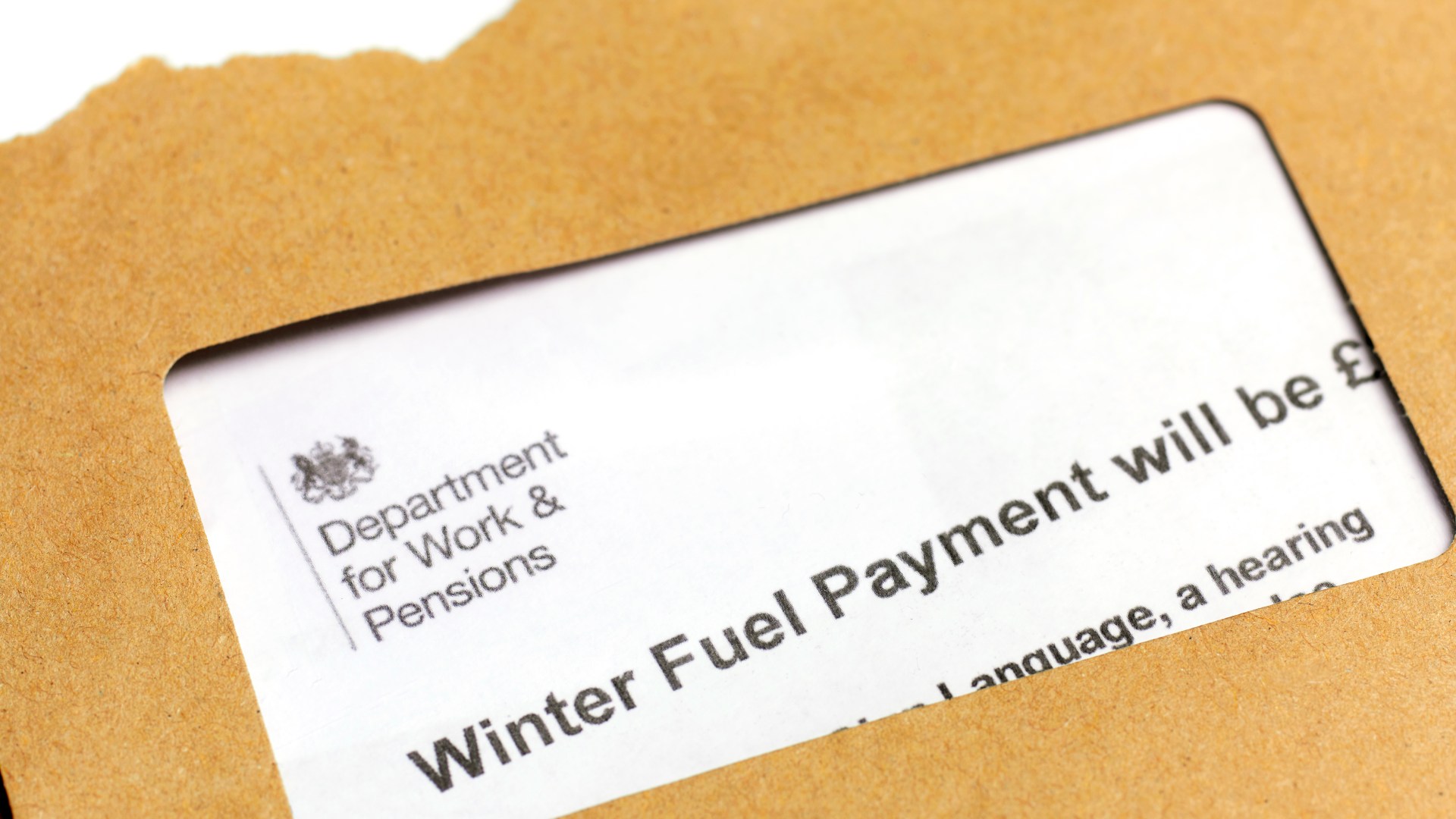Money
Key Winter Fuel Payment dates explained including final deadline to apply and when payments land in bank accounts

STRUGGLING pensioners can now start to apply for up to £300 of cash handed out through the Winter Fuel Payment.
Most households do not need to apply and will automatically be paid the cash.
However, a select group of people who are eligible need to apply in order to get the benefit.
If you live in England or Wales and were born before 23 September 1958, you will automatically receive the Winter Fuel Payment if you receive any of the following benefits:
- Pension Credit
- Universal Credit
- Income Support
- income-related Employment and Support Allowance (ESA)
- income-based Jobseeker’s Allowance (JSA)
- Child Tax Credit
- Working Tax Credit
However, anyone who lives abroad and qualifies for the Winter Fuel Payment will need to apply for it.
Read more Winter Fuel Payment
You can qualify if you live abroad in certain countries and the following conditions apply:
- You moved to the eligible country before January 1, 2021
- You were born before September 23, 1958
- You have a genuine and sufficient link to the UK – this can include having lived or worked in the UK and having family in the UK
You will need to claim Winter Fuel Payment even if you have got it before. The payment is not made automatically when you live abroad.
The eligible countries you can live in and claim are:
- Austria
- Belgium
- Bulgaria
- Croatia
- Czech Republic
- Denmark
- Estonia
- Finland
- Germany
- Hungary
- Iceland
- Ireland
- Italy
- Latvia
- Liechtenstein
- Lithuania
- Luxembourg
- Netherlands
- Norway
- Poland
- Romania
- Slovakia
- Slovenia
- Sweden
- Switzerland
Postal applications
Anyone living abroad and looking to apply households can now apply via post. You need to fill in the winter fuel payment claim form and post it to the Winter Fuel Payment Centre.
The form is available at gov.uk/winter-fuel-payment/how-to-claim.
The address to post to is:
Winter Fuel Payment Centre
Mail Handling Site A
Wolverhampton
WV98 1ZU
UK
Phone applications
You can also apply for the benefit by phone but not until October 28.
If you think you qualify and want to make an application this way, make a calendar note in your phone.
You will need to phone the Winter Fuel Payment Centre on +44 (0)191 218 7777.
When will the Winter Fuel Payment be made?
Most payments are made automatically in November or December.
If you qualify, you’ll get a letter telling you:
- How much you’ll get
- Which bank account it will be paid into
Payments are £200 for eligible households or £300 for eligible households where someone is aged over 80.
Deadline for claims
If you do not get a letter or the money has not been paid into your account by January 29, 2025, contact the Winter Fuel Payment Centre.
The deadline for you to make a claim for winter 2024 to 2025 is 31 March 2025.
Applying for Pension Credit
You will qualify for the Winter Fuel Payment if you qualify for selected means-tested benefits, most notably Pension Credit.
Hundreds of thousands of households are eligible for this benefit but aren’t claiming and are now set to miss out on the Winter Fuel Payment as a result.
You will need to have been claiming Pension Credit in the ‘qualifying week’ of 16 to 22 September 2024.
However, claims can be backdated by three months meaning you have until December 21 to make a claim and still get the Winter Fuel Payment.
Pension Credit tops up your weekly income to £218.15 if you are single or to £332.95 if you have a partner.
If your income is lower than this, you’re very likely to be eligible for the benefit.
However, if your income is slightly higher, you might still be eligible for pension credit if you have a disability, you care for someone, you have savings or you have housing costs.
You could get an extra £81.50 a week if you have a disability or claim any of the following:
- Attendance allowance
- The middle or highest rate from the care component of disability living allowance (DLA)
- The daily living component of personal independence payment (PIP)
- Armed Forces independence payment
- The daily living component of adult disability payment (ADP) at the standard or enhanced rate.
You could get the “savings credit” part of pension credit if both of the following apply:
- You reached State Pension age before April 6, 2016
- You saved some money for retirement, for example, in a personal or workplace pension
This part of the pension credit is worth £17.01 for single people or £19.04 for couples.
Crucial to claim Pension Credit if you can
HUNDREDS of thousands of pensioners are missing out on Pension Credit.
The Sun’s Assistant Consumer Editor Lana Clements explains why it’s imperative to apply for the benefit..
Pension Credit is designed to top up the income of the UK’s poorest pensioners.
In itself the payment is a vital lifeline for older people with little income.
It will take weekly income up to to £218.15 if you’re single or joint income to £332.95.
Yet, an estimated 800,000 don’t claim this support. Not only are they missing on this cash, but far more extra support that is unlocked when claiming Pension Credit.
With the winter fuel payment – worth up to £300 now being restricted to pensioners claiming Pension Credit – it’s more important than ever to claim the benefit if you can.
Pension Credit also opens up help with housing costs, council tax or heating bills and even a free TV licence if you are 75 or older.
All this extra support can make a huge difference to the quality of life for a struggling pensioner.
It’s not difficult to apply for Pension Credit, you can do it up to four months before you reach state pension age through the government website or by calling 0800 99 1234.
You’ll just need your National Insurance number, as well as information about income, savings and investments.
Money
Still time to register for MMI London


There is still time to register for our flagship conference, Money Marketing Interactive London, which takes place in five days’ time.
This not-to-be missed event, in association with Fundment, will be held at Convene, 155 Bishopsgate, on Tuesday, 8 October.
The day will be packed with intriguing sessions led by industry experts and thought leaders.
Some of the subjects they will explore include the impact of the Consumer Duty twelve months on and the implications of the FCA’s new SDR proposals.
MMI London will feature practical sessions on key supplier relationships including platforms, back-office systems, and investment management options as well as run the rule over tax planning and investment strategies to help advisers provide value-added advice.
NextGen Planners will also be there to talk more on philanthropy and sustainable investing.
Our keynote speaker, broadcaster and journalist will chat to delegates about the impact of the new Labour government on financial regulation.
Timeline’s CEO Abraham Okusanya and Benchmark Capital CEO Ed Dymott will be among those on a panel discussion to help you choose the right tech stack for your business.
The event will give people the chance to connect with peers, experts and potential collaborators during our networking sessions.
The conference is not just about gaining knowledge; it’s an opportunity to foster meaningful relationships that can drive your business’ success.
There will be workshops from SimplyBiz, Albemarle Street Partners, HSBC Life, EV, Verve and a breakfast briefing by The Financial Planning Club too.
Workshop selections are now closed, but there is still opportunity to sign up on the day at the registration desk.
Reserve your 5-hour CPD accredited place today and join us.
You can register for free here.
To see the full agenda, click this link.
Money
Map reveals areas where house prices are falling – and the ‘affordable’ locations which are rising

THE areas where house prices are falling the most and the “affordable” locations where they’re rising have been revealed.
A typical home in the UK was worth £267,100 in August, 0.7%, or £1,970, more than a year ago, according to Zoopla.
On a monthly basis, the value of a typical home rose by £700.
House prices are now on track to rise 2.5% higher by the end of the year, Zoopla estimates.
Property sales have increased as mortgage rates are now at their lowest level for 15 months, making it cheaper for homeowners to borrow money.
A borrower who is looking to remortgage and owns 25% of their home can now lock into a five-year deal at 4.3% down from 5.5% a year ago.
Read more on house prices
On a loan with £250,000 left to pay this would be equivalent to a £250 decrease in the amount they would need to spend on their mortgage each month.
Meanwhile, interest rates have continued to fall as lenders compete with each other to attract borrowers.
The number of buyers looking for a new home and homeowners putting their property on the market has risen as a result.
As more buyers return to the market the level of competition for each home has increased, which has moderately pushed up property prices.
The website said affordability continues to constrain house price growth, particularly in southern England.
Greater choice for home buyers is also expected to keep house price growth in check in the months ahead.
And not all homes are fresh to the market. A fifth of homes currently for sale were previously on the market at some stage in the past two years, according to Zoopla’s data.
Setting the right price is important to attract buyers, Zoopla said.
How have prices changed per region?
Manchester has seen the greatest increase in house prices of any region in England, with the value of a typical property up 2.3% in the past year.
An average home in the city is now worth £227,200.
Liverpool has also seen prices climb in the past 12 months, pushing up the value of a typical property to £160,400, which is 2% higher than a year ago.
But not all regions have seen house prices rise in the last year.
Aberdeen and Glasgow have both seen prices tumble by 1% since last August, the greatest fall of any UK region.
A typical home in Aberdeen is now worth £135,700 while in Glasgow it’s £150,200.
Cambridge also saw prices edge down by 0.1% in the past year but the value of an average home is still well above the national average.
A typical property in the area was worth £469,300 in August, £202,200 more than the national average.
Meanwhile, prices remained unchanged in Bournemouth and Leicester over the past year.
A typical home in Bournemouth is still worth £333,800 after seeing nothing added to its value in the past 12 months.
Meanwhile, an average property in Leicester is worth £226,200 after its value failed to increase in the past year.
Here are the average prices in August and their annual change, according to Zoopla:
- Belfast – £1,78,200, 5.1%
- Manchester – £227,200, 2.3%
- Liverpool – £160,400, 2%
- Glasgow – £150,200, 1.9%
- Leeds – £210,600, 1.7%
- Cardiff – £256,000, 1.6%
- Sheffield – £173,300, 1.4%
- Birmingham – £211,800, 1.3%
- Newcastle – £155,400, 1%
- Nottingham – £203,700, 0.9%
- Edinburgh – £273,400, 0.8%
- Oxford – £452,000, 0.6%
- Bristol – £340,100, 0.3%
- Southampton – £258,400, 0.2%
- Bournemouth – £333,800, 0%
- Leicester – £226,200, 0%
- Cambridge – £469,300, -0.1%
- Aberdeen – £135,700, -0.1%
- Portsmouth – £279,800, -1%
Richard Donnell, executive director at Zoopla said: “Lower mortgage rates are delivering a much-needed confidence boost to homeowners, many of whom have sat on the sidelines over the last two years.
“Market activity is up across the board and expectations of lower borrowing costs will continue to bring buyers and sellers into the market.”
Who else tracks house prices?
Halifax is part of Lloyds Group, which is the UK’s biggest mortgage lender.
Its monthly house price index is based on the mortgage data it holds and has been going since 1983.
It’s one of several key barometers of the property market.
The official measure of house prices is from the Office for National Statistics, which uses data from the Land Registry where the actual sold price is recorded.
This is the most accurate of all the indices, but the figures come out three months after the homes are sold, so there’s a big time lag.
Halifax and Nationwide each publish a monthly index tracking the average prices of homes on which they provide mortgages.
While they do adjust their figures to iron out big outliers, both lenders measure average house prices based on the properties they see.
As it’s based on mortgage approvals, cash buyers are not included.
Rightmove and Zoopla also publish monthly house price data.
The former is based on asking prices from the property listings on its website.
The latter uses sold prices, mortgage valuations and data on agreed sales.
Neither takes into account the price a property actually sold for like the ONS Land Registry, which could end up being higher or lower and some might not even sell at all.
Here’s the latest data from other indices:
- Rightmove (September 2024) +0.8% monthly, +1.2% annually
- Nationwide (August 2024) +0.7% monthly, +3.2% annually
- Halifax (August 2024) +0.3% monthly, +4.3% annually
- ONS Land Registry (July 2024) +2.2% monthly, +2.2% annually
How to get the best deal on your mortgage
IF you’re looking for a traditional type of mortgage, getting the best rates depends entirely on what’s available at any given time.
There are several ways to land the best deal.
Usually the larger the deposit you have the lower the rate you can get.
If you’re remortgaging and your loan-to-value ratio (LTV) has changed, you’ll get access to better rates than before.
Your LTV will go down if your outstanding mortgage is lower and/or your home’s value is higher.
A change to your credit score or a better salary could also help you access better rates.
And if you’re nearing the end of a fixed deal soon it’s worth looking for new deals now.
You can lock in current deals sometimes up to six months before your current deal ends.
Leaving a fixed deal early will usually come with an early exit fee, so you want to avoid this extra cost.
But depending on the cost and how much you could save by switching versus sticking, it could be worth paying to leave the deal – but compare the costs first.
To find the best deal use a mortgage comparison tool to see what’s available.
You can also go to a mortgage broker who can compare a much larger range of deals for you.
Some will charge an extra fee but there are plenty who give advice for free and get paid only on commission from the lender.
You’ll also need to factor in fees for the mortgage, though some have no fees at all.
You can add the fee – sometimes more than £1,000 – to the cost of the mortgage, but be aware that means you’ll pay interest on it and so will cost more in the long term.
You can use a mortgage calculator to see how much you could borrow.
Remember you’ll have to pass the lender’s strict eligibility criteria too, which will include affordability checks and looking at your credit file.
You may also need to provide documents such as utility bills, proof of benefits, your last three month’s payslips, passports and bank statements.
Do you have a money problem that needs sorting? Get in touch by emailing money-sm@news.co.uk.
Plus, you can join our Sun Money Chats and Tips Facebook group to share your tips and stories
Money
M&G supplies £200m of debt for Metrobox and PineBridge Benson Elliot

Two loans will refinance debt secured against four Metrobox retail warehouses and fund PineBridge’s development of two London warehouses.
The post M&G supplies £200m of debt for Metrobox and PineBridge Benson Elliot appeared first on Property Week.
Money
ZeroKey appoints former FE fundinfo head of proposition to advisory role


ZeroKey has brought on board former FE fundinfo head of proposition Stephen Mitchell in an advisory role.
He previously spent 18 years at FE fundinfo and spanned both the asset management and financial advice sides of the business, including FE Analytics and FE CashCalc.
Since leaving FE fundinfo earlier this year he has taken a variety of advisory roles, which he will combine with his latest role with ZeroKey.
ZeroKey co-founder and chief executive Joseph Williams said: “Steve is a big believer in how 1% improvements can all add up to make a significant difference.
“His approach is therefore completely aligned to what we are seeking to achieve with ZeroKey, but more importantly Steve brings with him vast knowledge and experience, and will inject an exciting dynamic into the team.”
Mitchell added: “I passionately believe in the theory that the aggregation of marginal gains can slowly but surely transform our profession and help to close the advice gap.
“So as soon as I heard what Joe [Williams] and Matt [Wiltshire] were up to, I was keen to get involved. They are a formidable team and I’m very excited by what’s to come.”
The news of Mitchell joining ZeroKey comes shortly after the publication of NextWealth’s latest research, which highlighted integration between systems is still a significant pain point and re-keying data is a major source of frustration.
This further added to the findings published independently by Intelliflo and FE fundinfo earlier this year and original research by Origo and the Lang Cat in 2019.
ZeroKey is currently available to use in beta mode.
This includes integrations with both Intelliflo and Iress, as well as ‘quick actions’ into FE CashCalc, Voyant, 7IM, Fidelity, Fintegrate, Fundment, Oxford Risk, Transact, Aviva, Timeline, Mabel Insights, M&G and Abrdn.
A ‘quick action’ is a feature that is designed to help streamline repetitive tasks, such as manually keying client details into a platform.
Money
Bank payments could be delayed by FOUR days under new anti-fraud rules coming in this month

BANK payments for millions of customers could be paused by up to four days as part of a crackdown on fraudsters.
Banks and building societies currently have up to the end of the next business day to process or decline a transfer.
But under new Government legislation coming into effect at the end of the month, this will be extended by an extra 72 hours.
It will give banks more time to investigate potentially fraudulent activity that can see customers scammed out of their hard-earned cash.
It comes as Government figures reveal an estimated £460million was lost to fraud just last year.
Tulip Siddiq, economic secretary to the Treasury, said: “Hundreds of millions of pounds are lost to scammers each year, targeting vulnerable communities and ruining the lives of ordinary people.
“We need to protect these people better, which is why we are giving banks more time to investigate suspicious payments and break the criminal spell that scammers weave.”
The new law will better protect a growing number of vulnerable customers targeted by purchase and “romance” scams.
These scams see victims targeted and tricked into transferring large amounts of money.
Ben Donaldson, UK Finance managing director of economic crime, said it was “delighted” to see the new legislation put forward.
He added: “This could allow payment service providers time to get in touch with customers and give them the advice and support they need to avoid being coerced by the criminals who want to steal their money.
“This could potentially limit the psychological harms that these awful crimes can cause and stop money getting into the hands of criminals.”
Under the new rules, banks who believe a customer could be scammed will need to tell them if their payment is being delayed.
They will also have to explain to the customer what they need to do to unblock any payments and compensate them for any interest or late payment fees they receive because of any delays.
Rocio Concha, director of policy and advocacy from Which?, said the new law was a “positive step in the fight against fraud”.
“While it should not affect the vast majority of everyday payments, it’s important that banks can delay a bank transfer and take action if they think a customer is being targeted by a scam.”
The new rules on extending the time banks have to investigate fraudulent transfers will come in just weeks after the introduction of a fresh scheme on fraud compensation.
UK banks currently don’t have to compensate customers who have been scammed out of money.
However, from next Monday (October 7), refunds up to a cap of £85,000 will become compulsory.
Nicola Bannister, customer support direct at TSB, said the bank welcomed the new rules coming into force.
She added: “Social media and telephone companies must now work tirelessly to cut fraud off at source and protect their users from scam content.”
How to protect yourself from fraud
While the Government’s new law will go some way to protecting customers from being scammed, there are other steps you can take to avoid being conned out of cash, according to Action Fraud.
First, never give out any personal information including your name, address, bank details, email or phone number, to organisations before checking they are legitimate.
And always think twice when receiving an unsolicited call, text or email requesting these types of details.
Instead, contact the company directly using a known email or phone number.
Second, make sure your computer, laptop and phone has up-to-date anti-virus software installed which will block any malware.
Third, always keep an eye out for phishing emails or texts which pretend to be legitimate but are designed to steal your personal information.
These messages usually come with a link which, if clicked on, can see your personal information including bank details stolen.
Fourth, be wary of post, phone calls or emails offering you business deals out of the blue.
If an offer seems too good to be true, it probably is, so always question it.
Who to contact if you’ve been defrauded
If you think you’ve fallen for a scam, report it to Action Fraud on 0300 1123 2040.
You can also contact Action Fraud by using its online tool found via https://www.actionfraud.police.uk/reporting-fraud-and-cyber-crime.
Once you’ve done this, your report will be sent to the National Fraud Intelligence Bureau (NFIB) which is part of the City of London police.
Money
Nido Living appoints new CFO ahead of expansion

As CFO, Ryan Lee will work closely with chief executive Carlo Matta, and chief operating officer Darren Gardner.
The post Nido Living appoints new CFO ahead of expansion appeared first on Property Week.
-

 Womens Workouts1 week ago
Womens Workouts1 week ago3 Day Full Body Women’s Dumbbell Only Workout
-

 Technology2 weeks ago
Technology2 weeks agoWould-be reality TV contestants ‘not looking real’
-

 Science & Environment2 weeks ago
Science & Environment2 weeks agoHow to unsnarl a tangle of threads, according to physics
-

 Science & Environment2 weeks ago
Science & Environment2 weeks agoMaxwell’s demon charges quantum batteries inside of a quantum computer
-

 Science & Environment2 weeks ago
Science & Environment2 weeks agoHyperelastic gel is one of the stretchiest materials known to science
-

 Science & Environment2 weeks ago
Science & Environment2 weeks ago‘Running of the bulls’ festival crowds move like charged particles
-

 News2 weeks ago
News2 weeks agoOur millionaire neighbour blocks us from using public footpath & screams at us in street.. it’s like living in a WARZONE – WordupNews
-

 Science & Environment2 weeks ago
Science & Environment2 weeks agoHow to wrap your mind around the real multiverse
-

 Science & Environment2 weeks ago
Science & Environment2 weeks agoLiquid crystals could improve quantum communication devices
-

 Science & Environment2 weeks ago
Science & Environment2 weeks agoSunlight-trapping device can generate temperatures over 1000°C
-

 Science & Environment2 weeks ago
Science & Environment2 weeks agoITER: Is the world’s biggest fusion experiment dead after new delay to 2035?
-

 Science & Environment2 weeks ago
Science & Environment2 weeks agoPhysicists are grappling with their own reproducibility crisis
-

 Science & Environment2 weeks ago
Science & Environment2 weeks agoQuantum ‘supersolid’ matter stirred using magnets
-

 News2 weeks ago
News2 weeks agoYou’re a Hypocrite, And So Am I
-

 Science & Environment2 weeks ago
Science & Environment2 weeks agoWhy this is a golden age for life to thrive across the universe
-

 Science & Environment2 weeks ago
Science & Environment2 weeks agoQuantum forces used to automatically assemble tiny device
-

 Sport2 weeks ago
Sport2 weeks agoJoshua vs Dubois: Chris Eubank Jr says ‘AJ’ could beat Tyson Fury and any other heavyweight in the world
-

 Science & Environment2 weeks ago
Science & Environment2 weeks agoCaroline Ellison aims to duck prison sentence for role in FTX collapse
-

 Science & Environment2 weeks ago
Science & Environment2 weeks agoNuclear fusion experiment overcomes two key operating hurdles
-

 Science & Environment2 weeks ago
Science & Environment2 weeks agoTime travel sci-fi novel is a rip-roaringly good thought experiment
-

 Science & Environment2 weeks ago
Science & Environment2 weeks agoLaser helps turn an electron into a coil of mass and charge
-

 Science & Environment2 weeks ago
Science & Environment2 weeks agoNerve fibres in the brain could generate quantum entanglement
-
News2 weeks ago
the pick of new debut fiction
-

 News2 weeks ago
News2 weeks agoIsrael strikes Lebanese targets as Hizbollah chief warns of ‘red lines’ crossed
-

 CryptoCurrency2 weeks ago
CryptoCurrency2 weeks agoCardano founder to meet Argentina president Javier Milei
-

 Science & Environment2 weeks ago
Science & Environment2 weeks agoMeet the world's first female male model | 7.30
-

 News2 weeks ago
News2 weeks ago▶️ Media Bias: How They Spin Attack on Hezbollah and Ignore the Reality
-

 Womens Workouts2 weeks ago
Womens Workouts2 weeks agoBest Exercises if You Want to Build a Great Physique
-

 News2 weeks ago
News2 weeks agoWhy Is Everyone Excited About These Smart Insoles?
-
Business2 weeks ago
JPMorgan in talks to take over Apple credit card from Goldman Sachs
-

 Science & Environment2 weeks ago
Science & Environment2 weeks agoA slight curve helps rocks make the biggest splash
-

 Science & Environment2 weeks ago
Science & Environment2 weeks agoQuantum time travel: The experiment to ‘send a particle into the past’
-

 Science & Environment2 weeks ago
Science & Environment2 weeks agoA new kind of experiment at the Large Hadron Collider could unravel quantum reality
-

 Science & Environment2 weeks ago
Science & Environment2 weeks agoWhy we need to invoke philosophy to judge bizarre concepts in science
-

 Science & Environment2 weeks ago
Science & Environment2 weeks agoFuture of fusion: How the UK’s JET reactor paved the way for ITER
-

 CryptoCurrency2 weeks ago
CryptoCurrency2 weeks agoBitcoin miners steamrolled after electricity thefts, exchange ‘closure’ scam: Asia Express
-

 CryptoCurrency2 weeks ago
CryptoCurrency2 weeks agoDorsey’s ‘marketplace of algorithms’ could fix social media… so why hasn’t it?
-

 CryptoCurrency2 weeks ago
CryptoCurrency2 weeks agoDZ Bank partners with Boerse Stuttgart for crypto trading
-

 CryptoCurrency2 weeks ago
CryptoCurrency2 weeks agoBitcoin bulls target $64K BTC price hurdle as US stocks eye new record
-

 CryptoCurrency2 weeks ago
CryptoCurrency2 weeks agoLow users, sex predators kill Korean metaverses, 3AC sues Terra: Asia Express
-

 CryptoCurrency2 weeks ago
CryptoCurrency2 weeks agoEthereum is a 'contrarian bet' into 2025, says Bitwise exec
-

 Womens Workouts2 weeks ago
Womens Workouts2 weeks agoEverything a Beginner Needs to Know About Squatting
-

 News2 weeks ago
News2 weeks agoFour dead & 18 injured in horror mass shooting with victims ‘caught in crossfire’ as cops hunt multiple gunmen
-

 Womens Workouts1 week ago
Womens Workouts1 week ago3 Day Full Body Toning Workout for Women
-

 Travel1 week ago
Travel1 week agoDelta signs codeshare agreement with SAS
-

 Politics1 week ago
Politics1 week agoHope, finally? Keir Starmer’s first conference in power – podcast | News
-

 Technology5 days ago
Technology5 days ago‘From a toaster to a server’: UK startup promises 5x ‘speed up without changing a line of code’ as it plans to take on Nvidia, AMD in the generative AI battlefield
-

 Health & fitness2 weeks ago
Health & fitness2 weeks agoThe maps that could hold the secret to curing cancer
-

 Science & Environment2 weeks ago
Science & Environment2 weeks agoUK spurns European invitation to join ITER nuclear fusion project
-

 CryptoCurrency2 weeks ago
CryptoCurrency2 weeks agoRedStone integrates first oracle price feeds on TON blockchain
-

 Sport2 weeks ago
Sport2 weeks agoUFC Edmonton fight card revealed, including Brandon Moreno vs. Amir Albazi headliner
-

 CryptoCurrency2 weeks ago
CryptoCurrency2 weeks agoBlockdaemon mulls 2026 IPO: Report
-

 Technology2 weeks ago
Technology2 weeks agoiPhone 15 Pro Max Camera Review: Depth and Reach
-

 News2 weeks ago
News2 weeks agoBrian Tyree Henry on voicing young Megatron, his love for villain roles
-

 CryptoCurrency2 weeks ago
CryptoCurrency2 weeks agoCoinbase’s cbBTC surges to third-largest wrapped BTC token in just one week
-

 Servers computers1 week ago
Servers computers1 week agoWhat are the benefits of Blade servers compared to rack servers?
-

 News3 weeks ago
News3 weeks ago▶️ Hamas in the West Bank: Rising Support and Deadly Attacks You Might Not Know About
-

 Health & fitness2 weeks ago
Health & fitness2 weeks agoThe secret to a six pack – and how to keep your washboard abs in 2022
-

 Science & Environment2 weeks ago
Science & Environment2 weeks agoBeing in two places at once could make a quantum battery charge faster
-

 Science & Environment2 weeks ago
Science & Environment2 weeks agoHow one theory ties together everything we know about the universe
-

 Science & Environment2 weeks ago
Science & Environment2 weeks agoHow do you recycle a nuclear fusion reactor? We’re about to find out
-

 Science & Environment2 weeks ago
Science & Environment2 weeks agoTiny magnet could help measure gravity on the quantum scale
-

 CryptoCurrency2 weeks ago
CryptoCurrency2 weeks agoCrypto scammers orchestrate massive hack on X but barely made $8K
-

 CryptoCurrency2 weeks ago
CryptoCurrency2 weeks agoTelegram bot Banana Gun’s users drained of over $1.9M
-

 CryptoCurrency2 weeks ago
CryptoCurrency2 weeks agoVonMises bought 60 CryptoPunks in a month before the price spiked: NFT Collector
-

 CryptoCurrency2 weeks ago
CryptoCurrency2 weeks ago‘No matter how bad it gets, there’s a lot going on with NFTs’: 24 Hours of Art, NFT Creator
-

 CryptoCurrency2 weeks ago
CryptoCurrency2 weeks agoSEC asks court for four months to produce documents for Coinbase
-
Business2 weeks ago
How Labour donor’s largesse tarnished government’s squeaky clean image
-

 News2 weeks ago
News2 weeks agoBrian Tyree Henry on voicing young Megatron, his love for villain roles
-

 Womens Workouts2 weeks ago
Womens Workouts2 weeks agoHow Heat Affects Your Body During Exercise
-

 Womens Workouts2 weeks ago
Womens Workouts2 weeks agoKeep Your Goals on Track This Season
-

 Science & Environment2 weeks ago
Science & Environment2 weeks agoCNN TÜRK – 🔴 Canlı Yayın ᴴᴰ – Canlı TV izle
-

 Technology1 week ago
Technology1 week agoRobo-tuna reveals how foldable fins help the speedy fish manoeuvre
-

 Science & Environment1 week ago
Science & Environment1 week agoX-rays reveal half-billion-year-old insect ancestor
-

 Politics2 weeks ago
Politics2 weeks agoTrump says he will meet with Indian Prime Minister Narendra Modi next week
-

 Science & Environment2 weeks ago
Science & Environment2 weeks agoA tale of two mysteries: ghostly neutrinos and the proton decay puzzle
-

 News2 weeks ago
News2 weeks agoChurch same-sex split affecting bishop appointments
-

 Technology2 weeks ago
Technology2 weeks agoFivetran targets data security by adding Hybrid Deployment
-

 CryptoCurrency2 weeks ago
CryptoCurrency2 weeks agoLouisiana takes first crypto payment over Bitcoin Lightning
-

 CryptoCurrency2 weeks ago
CryptoCurrency2 weeks ago$12.1M fraud suspect with ‘new face’ arrested, crypto scam boiler rooms busted: Asia Express
-

 CryptoCurrency2 weeks ago
CryptoCurrency2 weeks agoDecentraland X account hacked, phishing scam targets MANA airdrop
-

 CryptoCurrency2 weeks ago
CryptoCurrency2 weeks agoBitcoin price hits $62.6K as Fed 'crisis' move sparks US stocks warning
-

 CryptoCurrency2 weeks ago
CryptoCurrency2 weeks agoCertiK Ventures discloses $45M investment plan to boost Web3
-

 CryptoCurrency2 weeks ago
CryptoCurrency2 weeks agoBeat crypto airdrop bots, Illuvium’s new features coming, PGA Tour Rise: Web3 Gamer
-

 CryptoCurrency2 weeks ago
CryptoCurrency2 weeks ago‘Silly’ to shade Ethereum, the ‘Microsoft of blockchains’ — Bitwise exec
-

 CryptoCurrency2 weeks ago
CryptoCurrency2 weeks agoVitalik tells Ethereum L2s ‘Stage 1 or GTFO’ — Who makes the cut?
-

 CryptoCurrency2 weeks ago
CryptoCurrency2 weeks agoEthereum falls to new 42-month low vs. Bitcoin — Bottom or more pain ahead?
-
Business2 weeks ago
Thames Water seeks extension on debt terms to avoid renationalisation
-
Politics2 weeks ago
‘Appalling’ rows over Sue Gray must stop, senior ministers say | Sue Gray
-

 Politics2 weeks ago
Politics2 weeks agoLabour MP urges UK government to nationalise Grangemouth refinery
-

 News2 weeks ago
News2 weeks agoBrian Tyree Henry on his love for playing villains ahead of “Transformers One” release
-
Politics2 weeks ago
UK consumer confidence falls sharply amid fears of ‘painful’ budget | Economics
-

 Womens Workouts2 weeks ago
Womens Workouts2 weeks agoWhich Squat Load Position is Right For You?
-

 TV2 weeks ago
TV2 weeks agoCNN TÜRK – 🔴 Canlı Yayın ᴴᴰ – Canlı TV izle
-

 News7 days ago
News7 days agoUS Newspapers Diluting Democratic Discourse with Political Bias
-

 Technology2 weeks ago
Technology2 weeks agoIs carbon capture an efficient way to tackle CO2?
-

 Technology2 weeks ago
Technology2 weeks agoCan technology fix the ‘broken’ concert ticketing system?
-

 Science & Environment2 weeks ago
Science & Environment2 weeks agoSingle atoms captured morphing into quantum waves in startling image
-

 Science & Environment2 weeks ago
Science & Environment2 weeks agoHow Peter Higgs revealed the forces that hold the universe together
-

 CryptoCurrency2 weeks ago
CryptoCurrency2 weeks ago2 auditors miss $27M Penpie flaw, Pythia’s ‘claim rewards’ bug: Crypto-Sec




You must be logged in to post a comment Login